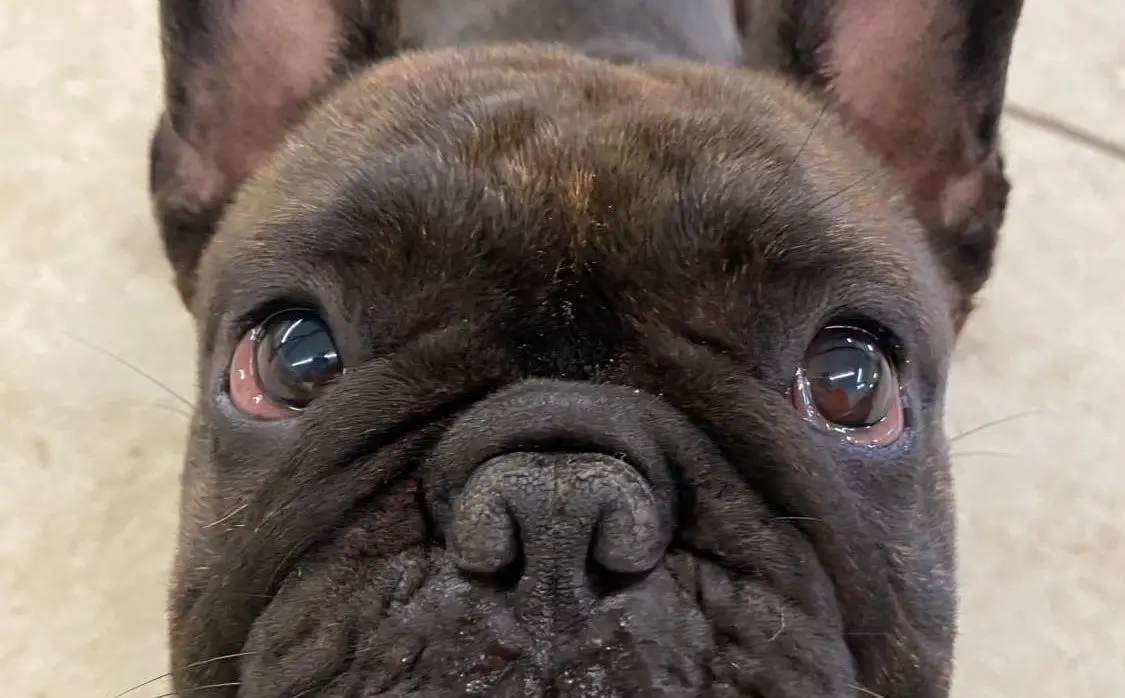Do you own a French bulldog? If so, you may have noticed that these adorable little dogs often pass gas.
While farting is completely normal for all breeds of dogs, French bulldogs seem to do it more frequently and with much more potency.
French Bulldogs often fart excessively due to factors like dietary changes, food intolerances, rapid eating leading to swallowed air, lack of exercise, and obesity.
- 11 Reasons Why Do French Bulldogs Fart So Much
- Remedies For French Bulldog Flatulence
- Probiotic Supplements
- Digestive Enzymes
- High-Fiber Foods
- Natural Herbs
- Activated Charcoal
- Coconut Oil
- Apple Cider Vinegar
- Yogurt with Live Cultures
- Chamomile Tea
- Regular Exercise and Playtime
- Smaller, Frequent Meals
- Avoiding Dairy and Soy Products
- Fresh Water Availability
- Elevated Food Bowls
- Switching to Grain-Free Diet
- Preventing Frenchie Farts
- When To Seek Veterinary Assistance For French Bulldog Flatulence
- FAQs
- Q: Is farting a common issue in French Bulldogs?
- Q: Can the type of food affect a French Bulldog’s farting?
- Q: How can I reduce my French Bulldog’s farting?
- Q: Why do French Bulldog farts smell so bad?
- Q: Can I feed my French Bulldog brown rice to reduce farting?
- Q: Are there any other measures I can take to prevent my French Bulldog from farting?
- Q: Can flatulence in French Bulldogs be a sign of a health issue?
- Q: Is farting a common issue in other dog breeds as well?
- Conclusion and final thoughts
11 Reasons Why Do French Bulldogs Fart So Much

French Bulldogs may fart so much due to a variety of reasons such as sensitive digestive systems, certain dietary choices, food intolerances, their eating habits, their unique anatomy, obesity, gastrointestinal infections, presence of worms, certain medications, stress or anxiety, and inflamed bowels.
Sensitive Digestive Systems
Sensitive digestive systems in French Bulldogs often contribute significantly to their excessive farting.
French Bulldogs are known for having sensitive digestive systems, which can make them more prone to gas production.
This sensitivity means that they can sometimes struggle to fully digest certain types of food, leading to an increase in gas as the undigested food ferments in the gut.
From my personal experience working with French Bulldogs, I’ve noticed that this breed’s digestive system can be particularly reactive to changes in diet.
For instance, introducing new foods or changing a Frenchie’s diet abruptly can often result in an increase in gas as their digestive system adjusts to the new ingredients.
Dietary Choices

Dietary choices play a crucial role in the amount of gas produced by French Bulldogs.
French Bulldogs, like all dogs, can react differently to various types of food. Certain dietary choices can lead to increased flatulence, especially if the food is high in fiber or difficult for the dog to digest.
For instance, foods rich in carbohydrates like peas, beans, and certain fruits are known to cause excessive gas. Similarly, some proteins, dairy products, and grains can also contribute to this issue.
From my experience as a vet, I’ve noticed that making careful dietary choices can significantly reduce the amount of gas produced by a French Bulldog. A diet that is balanced, easily digestible, and low in gas-producing ingredients can help keep a Frenchie’s flatulence at bay.
For instance, I once treated a French Bulldog that was experiencing excessive gas due to a diet high in soy-based products.
By switching the dog to a diet with alternative protein sources, we were able to greatly reduce the frequency and severity of the dog’s flatulence.
Food Intolerances or Allergies
Food intolerances or allergies can considerably increase the frequency of farting in French Bulldogs.
Just like humans, French Bulldogs can develop intolerances or allergies to certain types of food.
These intolerances or allergies can lead to a variety of symptoms, one of which is excessive gas.
This is because when a French Bulldog is unable to properly digest a certain type of food, it can result in increased fermentation in the gut, leading to more gas production.
Rapid Eating Habits

Rapid eating habits in French Bulldogs can often lead to excessive farting due to the excess air they swallow.
When a French Bulldog eats too quickly, they tend to swallow a lot of air along with their food. This condition is known as aerophagia, and it’s a common cause of excessive flatulence in dogs.
The swallowed air has to go somewhere, and it often exits the body in the form of gas, resulting in more frequent and potentially smellier farts says AKC.
In my years of veterinary practice, I have seen many French Bulldogs who were rapid eaters. One particular Frenchie that comes to mind is a lively little fellow named Max.
Max’s owners were concerned about his excessive gas, and upon observation, we noticed that Max would gobble up his food within seconds.
This rapid eating habit was causing him to swallow a significant amount of air, leading to his frequent farting episodes.
We advised Max’s owners to try using a slow-feed dog bowl, which is designed with obstacles that the dog has to navigate around to get to the food.
This helped Max eat slower, and swallow less air, and consequently, his gas issue improved significantly.
Anatomy
The unique anatomy of French Bulldogs, particularly their flat faces and compact digestive systems, can contribute to increased farting.
French Bulldogs are a brachycephalic breed, meaning they have shorter snouts and wider skulls. This characteristic can lead to certain health issues, including difficulties with digestion.
The shortened digestive tract of a French Bulldog sometimes causes food to be processed too quickly, leading to incomplete digestion and resulting in excessive gas says DogTime.
Obesity and Lack of Exercise

Obesity and lack of exercise can exacerbate the frequency and intensity of farting in French Bulldogs.
Extra weight and a sedentary lifestyle can negatively impact a French Bulldog’s digestive efficiency, leading to increased gas production.
When a dog weighs more than it should, the extra fat can put pressure on the digestive tract, slowing down digestion and causing more gas to be produced.
On the other hand, regular exercise helps stimulate intestinal motility, aiding digestion and reducing the amount of gas that gets built up in the system.
During my time as a vet, I treated an adorable French Bulldog named Louie, who was quite up in weight and led a rather inactive lifestyle.
His owners brought him in due to concerns about his excessive flatulence. Upon examination, it became evident that Louie’s obesity and lack of exercise were significant contributing factors to his gas problem.
Gastrointestinal Infections
Gastrointestinal infections can cause French Bulldogs to fart excessively due to the disruption they cause in the digestive system.
When a French Bulldog suffers from a gastrointestinal infection, it disrupts the normal function of their gut.
This can lead to an imbalance of the gut bacteria, which are essential for breaking down food and absorbing nutrients.
When these bacteria are out of balance, it can result in incomplete digestion and increased gas production says Britannica.
Presence of Worms

The presence of worms in a French Bulldog’s digestive system can lead to excessive farting as the parasites disrupt normal digestion.
Worms in a French Bulldog’s gut can interfere with the dog’s ability to properly digest their food.
This interference can lead to an increase in gas production, resulting in more frequent and potentially smellier farts.
These parasites can enter the dog’s system through various means, such as ingesting contaminated water or food, or even from coming into contact with infected feces says The Spruce Pets.
Certain Medications
Certain medications can increase the frequency and intensity of farting in French Bulldogs due to their potential impact on digestive processes.
Some drugs, particularly those designed to treat gastrointestinal issues, may have side effects that include increased gas production.
This is because these medications can alter the natural balance of gut flora or affect the speed at which food is digested, both of which can lead to more gas being produced and subsequently, more farting as per PDSA.
Stress or Anxiety

Stress or anxiety in French Bulldogs can lead to excessive farting as it may disrupt their digestive process and cause an increase in gas production.
When a French Bulldog experiences stress or anxiety, it can manifest physically in several ways, one of which is increased flatulence.
This happens because stress affects the normal functioning of the digestive system, leading to issues like upset stomach or increased gas production.
Inflamed Bowels
Inflammatory bowel disease (IBD) can cause a range of symptoms, including excessive gas. If your Frenchie has IBD, your vet will be able to provide advice on the best treatment plan to manage this condition.
Inflammation of the bowels, or colitis, can alter the way a French Bulldog’s body processes food.
The inflammation can interfere with the beneficial bacteria in the gut that aid digestion, leading to less efficient digestion and more gas being produced as per Purina.
This gas then exits the body as farts, which can be more frequent and smellier due to the disrupted digestion.
A cool study on French Bulldogs was done by Journals Plos which you can read here.
Remedies For French Bulldog Flatulence

To alleviate flatulence in French Bulldogs, a combination of dietary adjustments, natural remedies, and lifestyle changes can be utilized, including probiotic supplements, digestive enzymes, high-fiber foods, and regular exercise, among others.
Probiotic Supplements
Probiotic supplements can help balance the gut flora in your French Bulldog. These beneficial bacteria aid in digestion and can reduce gas production.
In my practice, I’ve recommended probiotics to many dog owners dealing with excessive flatulence.
One particular French Bulldog named Bella showed significant improvement after starting a daily probiotic supplement. Over time, her flatulence reduced, and her overall digestive health improved.
Digestive Enzymes
Digestive enzymes break down complex food molecules like proteins, fats, and carbohydrates, making them easier for your dog to digest.
This efficient breakdown of food can minimize the amount of gas produced during digestion.
Digestive enzymes are often available as chewable tablets or powders that can be mixed into your dog’s food, making them easy to administer as per Rover.
High-Fiber Foods

High-fiber foods can aid in digestion by adding bulk to the stool and promoting regular bowel movements.
This can help reduce gas build-up and subsequently, farting. Foods rich in fiber include vegetables like sweet potatoes and peas, or whole grains such as brown rice.
However, it’s important to introduce these foods gradually to avoid upsetting your dog’s stomach.
Natural Herbs
Natural herbs like ginger and fennel have been used for centuries to soothe upset stomachs and reduce gas production.
They can be incorporated into your dog’s diet in small amounts, either fresh or dried. Ginger, for instance, can be grated and added to your dog’s food, while fennel seeds can be ground and sprinkled over their meal.
Activated Charcoal
Activated charcoal can help absorb excess gas in the digestive tract, reducing flatulence. It’s often available in capsule form.
However, it should be used sparingly and under the guidance of a vet as it can also absorb medications and nutrients.
Coconut Oil

Coconut oil has anti-inflammatory properties that can soothe a dog’s digestive system, reducing discomfort and gas production.
In small amounts, it can be added to your French Bulldog’s food. However, too much coconut oil can lead to diarrhea, so it’s important to start with small doses.
Apple Cider Vinegar
Apple cider vinegar can help balance the pH in your dog’s stomach, aiding digestion and reducing gas production.
A small amount can be added to your dog’s water or food – about one teaspoon for every 15 pounds of body weight.
Yogurt with Live Cultures
Yogurt with live cultures, also known as probiotic yogurt, can provide beneficial bacteria to help balance gut flora, improve digestion, and decrease gas production.
Ensure the yogurt is plain and free from artificial sweeteners, which can be harmful to dogs.
Chamomile Tea
Chamomile tea is known for its soothing properties and can reduce gas production. It can be cooled and offered in small amounts to your dog.
However, it should not replace your dog’s regular water intake.
Regular Exercise and Playtime

Regular exercise and playtime can help stimulate digestion and release trapped gas, reducing flatulence.
This can involve daily walks, games of fetch, or other activities your French Bulldog enjoys. Physical activity is not only good for your dog’s digestive health, but it also contributes to their overall well-being.
Smaller, Frequent Meals
Feeding smaller, more frequent meals can help prevent your dog from gulping down food, which can lead to excess air in the stomach and more farting.
Rather than one or two large meals, consider giving your French Bulldog three to four smaller meals throughout the day.
Avoiding Dairy and Soy Products
Dairy and soy products can be hard for dogs to digest, leading to increased gas production.
These food items can be replaced with more digestible sources of protein and carbohydrates.
Fresh Water Availability
Keeping fresh water available at all times helps aid digestion and reduce gas production.
It’s essential for maintaining overall hydration, which contributes to better digestive health.
Elevated Food Bowls

Elevated food bowls can help reduce the amount of air your dog swallows while eating, which can decrease gas production and subsequent farting.
This simple change in feeding setup can make a significant difference in your dog’s flatulence.
Switching to Grain-Free Diet
Some dogs may have difficulty digesting grains, leading to increased gas production. A grain-free diet can be easier on a dog’s digestive system, potentially reducing flatulence.
Remember to consult with your vet before making any major changes to your dog’s diet.
Preventing Frenchie Farts

Preventing farts in French Bulldogs can be achieved through dietary adjustments, regular exercise, and proper feeding techniques.
Monitor Your Frenchie’s Diet
One of the most effective ways to prevent farts in French Bulldogs is by monitoring their diet. Certain foods such as beans, dairy, and high-fat foods can cause excessive gas in dogs.
It’s also important to ensure your Frenchie is not eating too quickly, as this can cause them to swallow air, which leads to more gas production.
In my practice, I’ve found that making these small changes in a dog’s eating habits can make a big difference in reducing flatulence.
Regular Exercise
Regular exercise can help stimulate digestion and release trapped gas in your French Bulldog, thus preventing farts.
This doesn’t have to be strenuous – a daily walk or playtime in the park can work wonders for your Frenchie’s digestive health.
Avoid Food Allergens
Some French Bulldogs may have food allergies or sensitivities that can lead to excessive gas. Common culprits include grains, soy, and certain types of protein.
If you suspect a food allergy might be causing your Frenchie’s farts, it’s best to consult with a vet for advice on modifying their diet.
Probiotics and Digestive Enzymes
Probiotics and digestive enzymes can aid in digestion and reduce gas production in French Bulldogs. These can come in the form of supplements or can be found in certain types of dog food.
In my experience, many dogs suffering from chronic flatulence have benefited from the addition of these supplements to their diet.
Smaller, Frequent Meals

Feeding your Frenchie smaller, frequent meals throughout the day rather than one or two large ones can prevent them from gulping down their food and swallowing air, which can lead to more farting.
This simple adjustment can greatly reduce the frequency of farts in your French Bulldog.
Elevated Food Bowls
Using elevated food bowls can help reduce the amount of air your French Bulldog swallows while eating, which can decrease gas production and subsequent farting.
I’ve recommended this simple solution to numerous dog owners in my practice. Many have reported a noticeable decrease in their dogs’ flatulence.
Keep Your Frenchie Hydrated
Ensuring your French Bulldog is well-hydrated aids digestion and can help reduce gas production. Always keep fresh water available for your Frenchie to drink.
When To Seek Veterinary Assistance For French Bulldog Flatulence

Seeking veterinary assistance for French Bulldog flatulence is necessary when it becomes chronic or excessive, or if it is accompanied by other concerning symptoms like diarrhea, vomiting, bloating, or changes in appetite or behavior.
While occasional gas is normal in dogs, persistent or severe flatulence can indicate an underlying health issue.
If your French Bulldog’s farting becomes frequent, particularly foul-smelling, or is associated with a noticeable change in their bowel movements, it’s time to consult with a vet.
Other signs that warrant immediate veterinary attention include noticeable abdominal bloating, loss of appetite, lethargy, or any signs of discomfort or pain.
In my practice, I once treated a French Bulldog named Max who was experiencing excessive flatulence along with diarrhea and a reduced appetite.
After performing some diagnostic tests, we discovered Max had a food intolerance that was causing his digestive issues. With a simple adjustment to his diet, Max’s flatulence reduced significantly and his overall health improved.
FAQs
Q: Is farting a common issue in French Bulldogs?
A: Yes, farting is a common issue in French Bulldogs due to their gassiness and sensitive stomachs.
Q: Can the type of food affect a French Bulldog’s farting?
A: Yes, the type of food can affect a French Bulldog’s farting. Certain foods such as spicy food, dairy products, and low-quality dog food can contribute to excessive gas.
Q: How can I reduce my French Bulldog’s farting?
A: To reduce your French Bulldog’s farting, you can try feeding them a high-quality dog food that is free from ingredients that can cause gas, such as dairy products or table scraps. Consulting with a veterinarian and considering probiotics can also help improve their digestion.
Q: Why do French Bulldog farts smell so bad?
A: French Bulldog farts can smell bad due to their sensitive digestive system and the types of food they consume. Foods that are difficult to digest or contain certain protein sources can lead to smelly farts.
Q: Can I feed my French Bulldog brown rice to reduce farting?
A: Yes, brown rice is a good source of fiber and can be included in a French Bulldog’s diet to promote better digestion and reduce excessive gas.
Q: Are there any other measures I can take to prevent my French Bulldog from farting?
A: Along with choosing the right food, you can also ensure that your French Bulldog eats slowly and doesn’t inhale their food, as this can lead to swallowing air and increased flatulence. Additionally, avoiding feeding them certain human foods that are known to cause gas can also help prevent farting.
Q: Can flatulence in French Bulldogs be a sign of a health issue?
A: In some cases, excessive flatulence in French Bulldogs could be a sign of an underlying health issue such as inflammatory bowel disease or a sensitive intestine. If you are concerned, it is recommended to consult with a veterinarian.
Q: Is farting a common issue in other dog breeds as well?
A: While farting can be more prevalent in brachycephalic breeds like French Bulldogs, it is not exclusive to them. Other breeds, such as Pugs, may also experience similar gassiness.
Conclusion and final thoughts
In conclusion, French Bulldogs are adorable and loving companions, but they can also be quite gassy.
Understanding the reasons behind their excessive flatulence is important in order to provide them with the proper care and remedies.
From diet changes to addressing potential medical issues, there are several ways to help reduce farting in French Bulldogs.





Leave a Reply